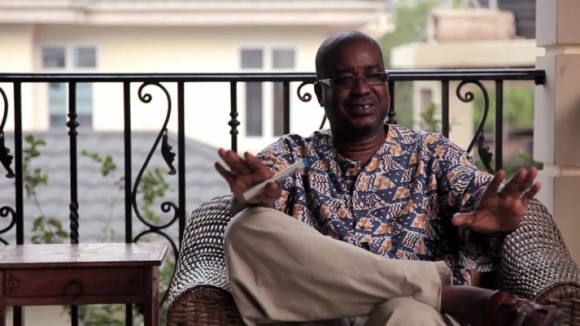Gossip
Herman Chinery-Hesse: Ghana’s pioneer software entrepreneur
A chat with Herman Chinery-Hesse could easily turn into a lesson in African history or a lesson in Nkrumahism. He speaks of Ghana in a way that makes it unrecognisable to many people, especially in these trying economic times.
A simple question about the pace of our growth could take you back 300 years to the slave trade; 50 years to Nkrumah; and five years to Zimbabwe and Mugabe. And he is no history professor. He is a techie; a software programmer.
More remarkably, a chat with Herman will teach you determination and optimism as you have never known before.
The growth of Herman
Herman was born in Ireland. With his parents holding high-profile international jobs, he had to grow up in places including Tanzania, Uganda, Sierra Leone and Switzerland. After completing his O’Levels at Mfantsipim School in Cape Coast, he went to the United States of America and eventually got a degree in Industrial Technology from the Texas State University. From America, he moved to the United Kingdom to work as a manufacturing engineer.
Then, in 1990, he moved to Ghana, determined to start a business. That was at a time when Ghana was still under military rule and the idea of leaving an engineering job in the UK to return home would be described charitably as outlandish. Herman braved it, and in 1991 launched a computer software business.
With his PC and his most treasured possession, his intelligent mind, he started writing software with his business partner (High school mate Joe Jackson) from his bedroom in his parents’ house. When his father returned home from abroad later to find to his dismay, human traffic moving to and from his son’s bedroom to conduct business, he kicked them out to the outhouse where they would remain for a few years.
Successful start of SOFTribe
SOFTtribe, the company he founded, found early success writing software for a travel agency that automated its accounting and customer service functions. That programme, called ‘Gbefaloh’ (meaning traveller in Ga), would go on to be used widely by travel agencies all around the country. A US$5,000 contract to write software to computerise a huge chicken farm would follow, and that would lead them to write inventory management software that would be sold to grocery shops throughout the country.
More products followed; each of them with the characteristic African name that you expect from the avowed Nkrumahist – Bimbilla for an accounting software, Akatua for a payroll software and so on.
It wasn’t long before the huge multinational contracts came in and SOFTtribe would go on to count among its numerous clients giant multinational and government organisations like Unilever, Guinness Breweries Ghana Ltd, PriceWaterhouseCoopers Ghana, Cargill, Ghana National Petroleum Company, the British High Commission and several others.
The company’s work would move beyond the shores of Ghana to affect several lives in countries such as Nigeria, Kenya, Senegal, Togo, Burkina Faso and many others. SOFTtribe would go on to become a respected software company in West Africa. Herman would go on to find worldwide acclaim, with profile features in global media organisations like BBC, The Guardian, CNN and many more, along with several monikers including ‘the Bill Gates of Ghana,’ ‘Africa’s father of Technology’ and so on.
Why not here?
Speaking at engagements at the likes of Harvard, Wharton, Cambridge and just last week, back-to-back at the UK’s House of Lords and Chatham House, have endeared him to a worldwide audience, often watching in bewilderment at how such a feat could be achieved in no other place than Ghana, Africa.
Herman chuckles at that and asks: why not here? A lack of infrastructure has meant that Africa cannot largely compete with the rest of the world in manufacturing. The mobile phone revolution and advent of the Internet, however, have levelled the field somewhat for Africans in the technology space, where Herman notes that we can compete brainpower for brainpower with anybody else in the world.
Innovation is at the heart of SOFTtribe’s products. Its popular payroll software, Akatua, has undergone a lot of innovative changes, now operating as a cloud service, with the help of the Internet, making it conveniently easier to use for even the small carpentry shop at Denu that employs 10 people.
The Hei-Julor!
SOFTtribe’s popular security application, Hei-Julor! (Developed in partnership with sister company BlackStarLine), uses GPS co-ordinates to alert a neighbourhood, a private security firm and partner radio stations when a victim of an armed attack sends a blank SMS. Paid for by a monthly subscription (through a scratch card called Keba-Ekong!), it is due to be launched in Cameroon in the coming months.
Keba-Ekong! It is a reusable all-purpose pay-as-you-go plastic card that is used for several other purchases in and outside Ghana. It can pay for a concert ticket, and very soon can pay merchandise on the virtual shopping mall called shopafrica53.com, which is luanching soon after some delay.
It will bring all sorts of African merchandise online for people, especially in the diaspora, to buy directly from the sellers. Described as an Amazon/PayPal type of service, it will allow merchants to accept payments on mobile phone and will give African craftspeople access to a global market.
Herman claims he has slowed down, having hit middle age. I don’t believe it after he goes on to tell me: “There are about twenty more Hei-Julors! to be launched; some for taxis, some for audiobooks, some for education and several more.” So much for slowing down.
If he says he has slowed down, the baton has fallen to an immensely capable team that SOFTtribe has painstakingly grown over the years. It is not enough to know how to code at SOFTtribe. You have to be able to debate philosophy…you have to be able to socialise…you have to be all-round. This, Herman believes, is at the heart of their innovative products. “To be able to be creative and inventive, you need data…you also need a scientific thinking and you need a broad general knowledge. You need to socialise. That’s how come you can come up with products. It is people who are in a situation and are aware of the situation that can be inventive for the situation,” he points out to me.
Need for partnerships
He likes what his little adventure over 20 years ago has become. But he emphasises that there will be more of such feats if our governments does more to protect local businesses. “The public sector is almost adversarial. That’s a very big problem. In some cases, they even work with foreigners against Ghanaians,” he bemoans.
“I think that we are in transition…we also have to be realistic. Many of us, our grandfathers were peasant farmers and then we are driving Mercedes…and in any part of the world in any currency, that would be regarded as progress,” he notes before recounting to me a story of a friend’s grandmother who was telling them about her childhood of hunter-gathering while at the same time using a microwave. Where you would criticise, Herman would celebrate.
The writer is Chairman of Oxford & Beaumont Solicitors and author of Kuenyehia On Entrepreneurship, considered a groundbreaking resource on Ghanaian entrepreneurship. @elikemkuenyehia.
Source: graphic.com.gh

















